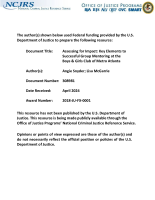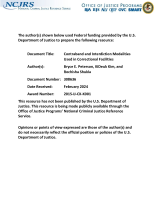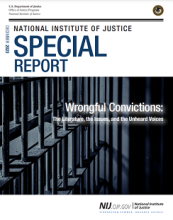Literature Reviews
A Dynamic Policing Simulation Framework
An Interdisciplinary Review of the Thanatomicrobiome in Human Decomposition
Characterizing the Natural Genetic and Epigenetic Diversity of Human Populations
UNIFIED COURT SYSTEMS - A RANKING OF THE STATES
Neuropsychology, Neuroscience, Volitional Impairment and Sexually Violent Predators: A Review of the Literature and the Law and Their Application to Civil Commitment Proceedings
VICTIMIZATION AND PERCEPTION OF CRIME IN A GHETTO COMMUNITY
The Impact of Offending Students' Apologies and Perceived Sincerity on the Physical and Emotional Distress of Victimized Teachers
Research, Evaluation, and Analysis of Call Handling on Three-Digit Hotlines (REACH-3D)
Assessing the Impact of an Innovative Response to Intimate Partner Violence Related Strangulation, Final Report & Outcome Evaluation
Evaluating Technology-Based Services for Victims of Crime
Three NIJ-funded evaluations enhance our understanding about the effectiveness of technology-based services for victims who experience crime and violence.
Applying a Developmental Evaluation Approach to Address Community Safety and Health Challenges of Reintegration Programs in the USA
The Consequences of Sibling Criminal Legal System Contact for Family Life
Assessing for Impact: Key Elements to Successful Group Mentoring at the Boys & Girls Club of Metro Atlanta
Webinar Transcript: Fiscal Year 2024 Evaluating Strategies to Advance the Implementation of Evidence-Based Policies and Practices Solicitation
This webinar provided an overview of the NIJ FY 2024 Evaluating Strategies to Advance the Implementation of Evidence-Based Policies and Practices solicitation, in which...
Webinar Transcript: NIJ FY 2024 Research and Evaluation on Youth Justice Topics
This webinar will provide an overview of the NIJ FY 2024 Research and Evaluation on Youth Justice Topics solicitation. In collaboration with the Office of Juvenile Justice and Delinquency Prevention, NIJ seeks applications for research and evaluation projects that inform policy and practice in the field of...
Webinar Transcript: NIJ FY 24 Evaluation on Desistance
NIJ hosted a webinar providing an overview of the NIJ FY 24 Evaluation on Desistance Solicitation, in which NIJ seeks proposals for rigorous evaluations of desistance-focused interventions to advance understanding of strategies that might aid in the desistance process and identify innovative approaches to measure the desistance process.





